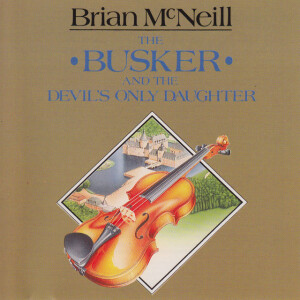 Debbie Skolnik wrote this review.
Debbie Skolnik wrote this review.
There is more to Brian McNeill’s albums than just the music they contain, although if you put one on without knowing a thing about McNeill, reading the liner notes or even looking at the song and tune titles, you could enjoy them purely on an auditory basis. But the liner notes are quite informative. At the very least, they give some hints about the motivations behind the songs. If they are McNeill’s own compositions, there’s a bit about what inspired them; if they are traditional in origin, then there’s some history as to how they came about.
But McNeill is not only an accomplished musician and songwriter, he is an author too, and The Busker And The Devil’s Only Daughter is the companion CD to the first of his two novels about Alex Fraser, a busker. (The other novel is titled To Answer The Peacock.) The liner notes are a story about McNeill and Fraser, written as if Fraser is more than a fictional construct. Who knows? Perhaps he is …
The songs for this album were clearly chosen with the theme of the busker and his world in mind. As McNeill notes, the busker’s public likes a variety of things, and so there is a mix of tunes and songs on this album. The songs have a variety of origins – some American tunes such as “The Owl,” which McNeill learned in Alaska, and “Yankee Dollar” and “The Trip To Marblehead.” He also includes 18th century airs like “Miss Hamilton,” written by the Earl of Antrim’s harper, and an O’Carolan tune, “Captain O’Kane,” part of a medley he calls “McNeill’s Favourite,” which also includes “Jamie Allen” and “The Mason’s Apron.”
Even the names of the tunes and songs mean something in the busker’s argot. “The Sidewalk Reels” and “The Pavement Jigs” refer to that place on the street where buskers are usually found,. “The Perfect Pitch” (one of the tunes comprising “The Pavement Jigs”) is a reference to the ideal location for attracting generous listeners. “The Busker” needs no further explanation. “Salt The Pot” refers to seeding the busker’s hat with a few coins to encourage more of same from passersby, and “The Silver Waltz” is not necessarily a dance done by people, but “the dance of coins into the hat (or instrument case, or cup).” I certainly wouldn’t have known these things if he hadn’t explained them!
The music itself is an interesting mix. As is usual with McNeill’s albums, you will find some instrumentals and some songs.
Not only are the selections from different time periods and countries, but the album seems to have been assembled from a mix of live tracks (two) and studio tracks. As such, the sound quality is a bit uneven – the opening track, “The Sidewalk Reels,” is softer than the tracks that follow it. McNeill has some help from fellow musicians Cilla Fisher (sister of Archie and Ray Fisher), Alan Reid (from the Battlefield Band), Dougie Pincock and Duncan MacGillivray (former members of the Battlefield Band) and Robin Morton (from Boys Of The Lough). McNeill was a founding member of the Battlefield Band, in case you were wondering!
It is unclear who plays on what track, although “Lady Glasgow” is sung by a woman, so I’m guessing it’s got to be Cilla Fisher. This song has a music-hall sort of quality; it opens with a solo piano and Fisher’s voice, which reminds me a lot of Norma Waterson’s. The story is about an old prostitute who is past her prime, “a broken-down whore with a heart of gold” – it has a very poignant feel.
Highlights for me include the melancholy “High Handenhold,” a crisply played acoustic guitar instrumental, and “The Golden Ox/The Silver Waltz,” a jazzy, syncopated pair of tunes that I wish had gone on a bit longer. I love the classical feel and the tune of “The Gilded Shadows,” but there are a few off-pitch notes which surprise me each time I hear them. Getting to the title tracks, “The Devil’s Only Daughter” is one of the live tracks and is unusual in that it is a cappella except for a reprise of the tune on fiddle at the end. McNeill sings about a woman who is “The Devil’s Only Daughter,” and despite the fact that she leads him a merry chase, he loves her “best of all.” “The Busker” describes very well the enigma of a man who would choose the life of a street musician and the curious symbiosis between the musician and his audience.
As with all other albums I’ve heard by Brian McNeill, there is much to delight the listener. His creativity and eclectic approach to his music, laced with his honest passion for what he’s doing, make this worth seeking out despite some minor unevenness here and there.
(Temple, 1990)
Debbie has reveiewed more of McNeill’s work including his two previous CDs, No Gods and To Answer the Peacock and his novel, also named To Answer the Peacock.
